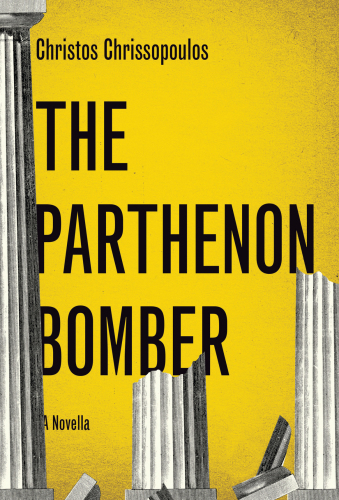
The Parthenon Bomber
A Novella
فرمت کتاب
ebook
تاریخ انتشار
2017
نویسنده
Christos Chrissopoulosناشر
Other Pressشابک
9781590518373
کتاب های مرتبط
- اطلاعات
- نقد و بررسی
- دیدگاه کاربران
نقد و بررسی

April 10, 2017
The first of his works to be translated into English, Chrissopoulos’s slight novella slyly imagines a monumental catastrophe. Inspired by a World War II–era manifesto by Yorgos V. Makris, secretary-general of the Society of Aesthetic Saboteurs of Antiquities, a young Athenian plots to blow up the famed Parthenon and free the stagnating city “from what was regarded as unsurpassable perfection.” The novella opens with a fascinating descent into the perpetrator’s mind, a “probable monologue” (the “authentic” confession having disappeared) that is at once a psychogeographical analysis of Athens and philosophical justification for the bombing: “In our city, it’s difficult to believe that any single thing really belongs to you.... Except, perhaps, an utter delusion: an act committed with full consciousness.” A series of witness statements paint a blurry portrait of the bomber as both grandiose romantic in thrall to an “adolescent messianism” and shy loner “scared by his own imagination.” (The biographical sketch of his radical forebear, Makris, is similarly sketchy.) Chrissopoulos briefly describes the stunned city’s reaction to the gaping absence, but the novella soon splinters into more fragments: evidentiary material, the musings of an Athenian seeing the destruction from his window (“Reality seemed delicate and fragile, diaphanous, like Japanese rice paper”) and another monologue from a troubled soldier. The novella’s multiple voices are too often indistinguishable from one another, but the overall effect is nonetheless haunting. The compiled dossier aims to impose order on the spectacular display of symbolic violence and its chaotic aftermath, an order which the dossier’s elliptical, dreamlike contents consistently explode.

May 15, 2017
You don't know what you've got till it's gone: thus this slender but deeply charged novella concerning an unspeakable--but sadly imaginable--act of terrorism."He keeps to himself, we don't see him often. He doesn't socialize like everyone else and rarely speaks." So, inevitably, says one of his neighbors after a 21-year-old Athenian known only as Ch.K. ("only his initials were released to the public") blows up the crowning achievement of classical Greek architecture, the Parthenon. Ch.K.'s logic is impeccable, after a fashion: the building is so beautiful, so powerful a testament to a civilization superior to the Greek present, that it forces Athenians to cast their eyes downward at their grimy, dirty city, "and that puts us into a bad mood, because she's unworthy of It, and no matter what we do, we will never become worthy of such a masterpiece." One can read Ch.K. as a nihilistic heir of Albert Camus' antihero Meursault, or one can see in Chrissopoulos' plainspoken tale, told as a multipart procedural, an extended metaphor for the decline of Greece as a poor stepchild to the European Union, overrun by refugees and mired in apathy. Naturally, like Mohamed Atta and company, Ch.K. sees grandeur in his act of destruction, a dare turned into deed: if everything in Athens "looks evanescent," as he proclaims, then how much more permanent a bomb crater will seem, something to shake the bourgeoisie to their core and rattle every window around. The state, naturally, has other ideas, and if some of the interviewees quietly agree that Athens truly did not live up to its wondrous past, that won't stop a few things from happening, one of them the construction of a "New Parthenon" scheduled to go up in months rather than centuries. Reminiscent of a half-century-old ancestor, Vassilis Vassilikos' 1966 novel Z, in its sardonic protest of things as they are.
COPYRIGHT(2017) Kirkus Reviews, ALL RIGHTS RESERVED.

April 15, 2017
In this provocatively titled novella, a lone individual known as Ch.K. plots to blow up the Parthenon, the enduring symbol of the city of Athens. His act, which takes place in the present, is inspired by the surrealist group Heralds of Chaos near the end of World War II, which called for the Parthenon's obliteration. Ironically, it is not foreign agents but a Greek citizen who is the perpetrator here. He contends, shockingly, that he meant no harm but desired "to free us from what was regarded as unsurpassable perfection." Multi-award-winning Greek novelist, essayist, and translator Chrissopoulos structures his tale as if he were presenting documentary evidence in the investigation of this crime. The opening chapter is a "probable monologue" of the perpetrator reflecting on his deed. This is followed, inter alia, by several witness testimonies, the statement of a guard who worked on the premises, other evidentiary material, and the sentence and punishment of Ch.K. Unfortunately, the imaginative crime setup for what would have been an international tragedy loses impact owing to the peculiar structuring. VERDICT More a meditation on the importance of artifacts in our lives than a thriller or adventure tale, this peerlessly translated work is recommended mainly to informed readers interested in cultural issues.--Edward B. Cone, New York
Copyright 2017 Library Journal, LLC Used with permission.

























دیدگاه کاربران